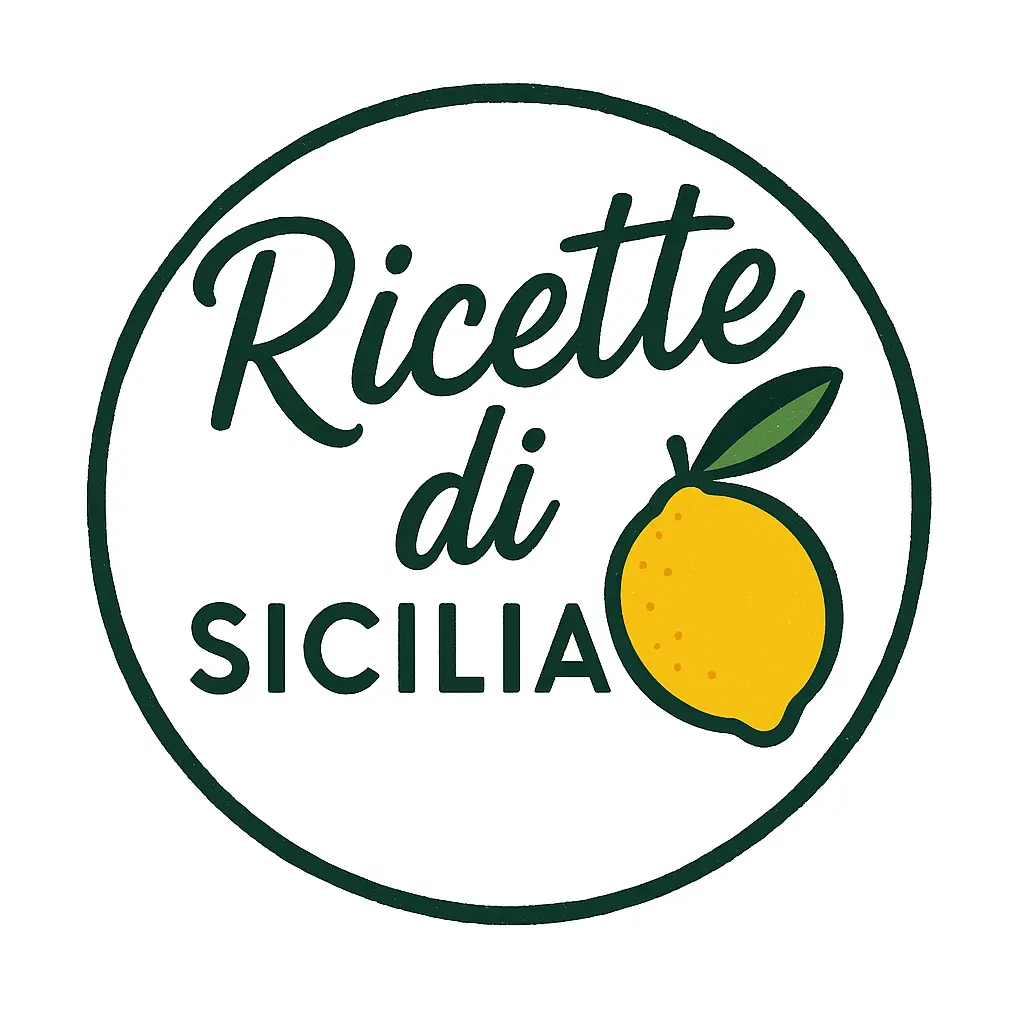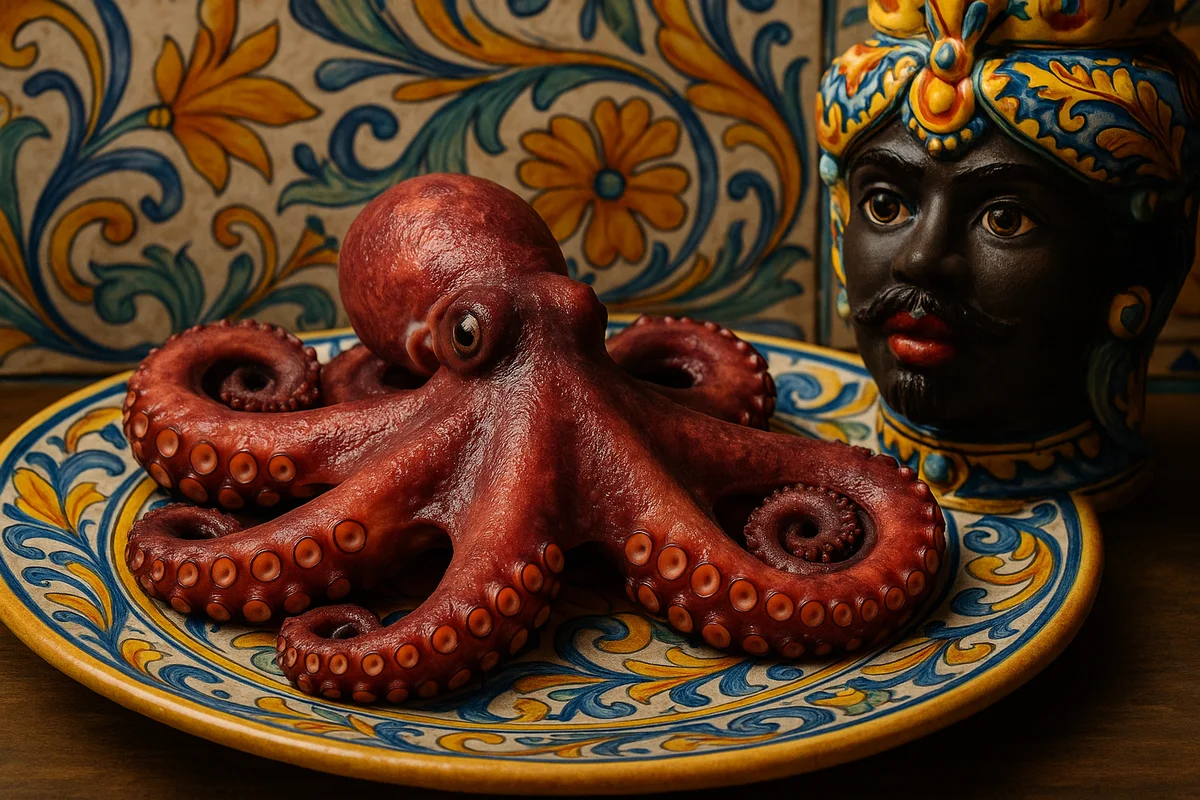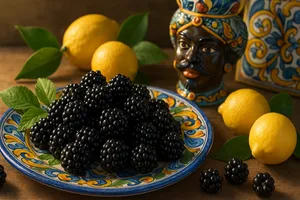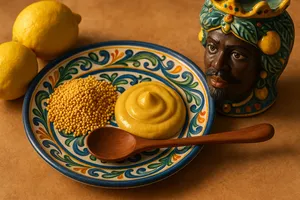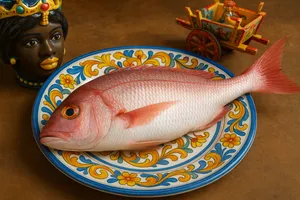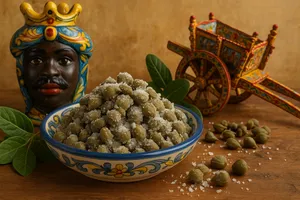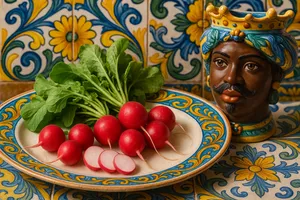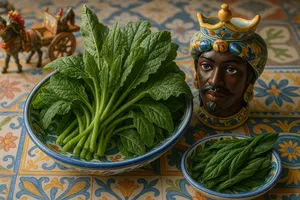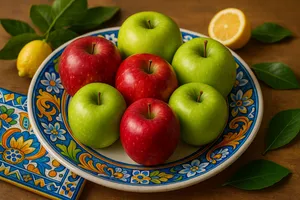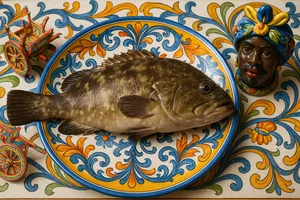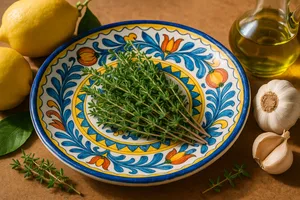Overview
Octopus — known in Sicilian dialect as purpu — is a prized cephalopod from the Octopodidae family. Recognisable by its eight tentacles lined with suction cups, soft mantle and remarkable intelligence, it thrives among the rocky seabeds of the Mediterranean and is fished abundantly in Sicilian waters. Its firm yet tender flesh, distinct maritime flavour and versatility make it a cornerstone of Sicilian coastal cooking.
Across Sicily, octopus appears in countless beloved preparations: simply boiled and dressed with olive oil and lemon, classic octopus salad, chargrilled octopus, slow-braised octopus in tomato, octopus with potatoes, and many more. Cooking it well is considered a craft — from tenderising and cleaning to achieving the ideal melt-in-the-mouth texture. When handled correctly, octopus becomes one of the great delicacies of Sicilian seafood cuisine; cooked poorly, it turns tough and unappealing. Mastery of its preparation is deeply rooted in the island’s culinary tradition.
Characteristics
The octopus has an oval, soft mantle with eight equal-length tentacles arranged in two rows of suction cups. Its colour ranges from grey to reddish-brown, and it can shift shade for camouflage. It varies widely in size, from a few hundred grams to specimens exceeding 5 kg, though most octopus used in everyday cooking weighs between 500 g and 2 kg.
Raw flesh is firm and compact, becoming tender when gently cooked. The flavour is distinctly marine, rich but clean. Texture is paramount: properly cooked octopus is yielding with a pleasant elasticity; overcooked or rushed octopus becomes rubbery. Fresh octopus should smell faintly of the sea, never sharp or ammoniacal.
A fresh specimen is recognised by bright eyes, taut glossy skin, firm tentacles and a light scent of the sea. Dull skin, an unpleasant smell or flaccid flesh suggest deterioration.
Octopus vs Polyp vs “Piovra”
Octopus (Octopus vulgaris): The species most commonly eaten, with eight equal-length tentacles and a typical weight of 0.5–3 kg. This is the octopus discussed in this article.
Polyp: A zoological term used broadly for tentacled cephalopods. In culinary contexts, “octopus” is the proper term.
“Piovra”: An Italian word often referring to very large octopuses (5–10+ kg) or to other species such as the giant Pacific octopus. In Sicily, “piovra” typically describes particularly large specimens, whose flesh tends to be firmer and suited to slow cooking.
Fishing
Octopus inhabits rocky seabeds from shallow waters down to around 200 metres, sheltering in crevices and venturing out mainly at night. It feeds on crustaceans, molluscs and small fish, and is noted for its intelligence and curiosity.
In Sicily, it is traditionally caught using terracotta pots (polpare), traps, spearfishing or simple baited lines. The island’s octopus-fishing techniques are centuries old and deeply rooted in coastal culture.
Freshly caught octopus is often “beaten” on rocks or hard surfaces to tenderise the flesh by breaking down its fibres — an age-old but still widespread practice.
Seasonality
Available year-round, octopus is at its best in autumn and winter, when the flesh is firmer and more flavourful. Summer specimens can be less abundant and slightly less robust.
How to Clean an Octopus
Cleaning is an essential step:
1. Remove the beak located at the centre of the tentacles.
2. Turn the head inside out and remove the innards.
3. Rinse thoroughly under running water.
4. Cut away the eyes.
5. Rub with coarse salt to remove the slimy coating (optional).
6. Rinse again.
Many opt for pre-cleaned octopus for convenience, though doing it at home ensures maximum freshness.
Tenderising Methods
Octopus can be tough if not prepared properly. Traditional Sicilian techniques include:
Beating: The ancient method of striking the octopus repeatedly against a hard surface to break down muscle fibres.
Freezing: Freezing for at least 24 hours naturally tenderises the flesh, which is why many restaurants use previously frozen octopus.
Slow cooking: Gentle simmering for 30–60 minutes depending on the size ensures the right texture.
Cork method: Adding a cork to the cooking water is a popular folk belief said to help tenderise the octopus — not scientifically proven, but widely practised.
Boiling Octopus
The classic method includes:
1. Bring a large pot of unsalted water to the boil.
2. “Scare” the octopus by dipping it in and out of the water three times to curl the tentacles.
3. Submerge fully and simmer gently for 30–60 minutes.
4. It is done when a fork pierces the tentacles easily and they detach with minimal resistance.
5. Allow to cool in the cooking water for extra tenderness.
Uses in Sicilian Cooking
Boiled Octopus
Served warm or at room temperature with olive oil, lemon, parsley, salt and pepper — a simple preparation that highlights the purity of the flesh.
Octopus Salad
Boiled octopus combined with boiled potatoes, celery, cherry tomatoes, olives and capers, dressed with olive oil and lemon. A summer favourite across Sicily.
Grilled Octopus
Often pre-boiled before being finished on the grill for a lightly charred, smoky flavour. Typically dressed with oil, lemon and oregano.
Braised Octopus
Slow-cooked with tomato, garlic, olive oil, parsley and white wine. Rich, comforting and ideal for soaking up with bread.
Octopus with Potatoes
A hearty variant of the braised version, enriched with diced potatoes that absorb the cooking juices.
“Affogato” Octopus
Cooked in its own liquid with tomato, garlic and olive oil. The octopus releases enough water to create a naturally rich sauce.
Pasta with Octopus
Octopus, whether boiled or braised, makes an exceptional pasta sauce — particularly with spaghetti, linguine or paccheri.
Storage
Fresh octopus keeps for 1–2 days in the fridge. Cooked octopus lasts 2–3 days when stored in an airtight container.
It freezes extremely well: cleaned and bagged, it keeps for 2–3 months. In fact, freezing improves tenderness.
Buying Tips
Check for freshness: bright eyes, glossy skin, firm tentacles and a clean scent. Avoid specimens that smell strong or appear dull and limp.
Frozen octopus is a perfectly valid option, and often preferred for its guaranteed tenderness. Always ask your fishmonger whether the product has been previously frozen.
Medium-sized octopus (around 1–1.5 kg) offers the best balance of flavour and texture.
Nutritional Properties
Octopus is a lean, protein-rich food. Per 100 g it provides around 80–85 kcal, 15–16 g of high-quality protein and minimal fat. It contains B vitamins, especially B12, and valuable minerals such as iron, calcium, phosphorus, potassium, selenium and zinc.
It is suitable for low-calorie diets, easily digestible when cooked gently and naturally rich in omega-3 and taurine.
Cultural Significance in Sicily
Octopus has a special place in Sicilian maritime culture. Traditional fishing with “polpare” pots is centuries old. Fishermen’s families prepared octopus in countless ways, making use of every part.
Many coastal towns host octopus festivals, celebrating both the catch and the dishes made from it. It symbolises the island’s intimate relationship with the sea.
Curiosities
Octopus is considered one of the most intelligent invertebrates, capable of memory, problem-solving and even tool use. Its intelligence has prompted ethical discussions around its consumption.
The traditional Sicilian method of “scaring” the octopus — dipping it three times into boiling water — helps curl the tentacles beautifully.
A well-known Sicilian saying goes: “U purpu si coci cu’ l’acqua so’” — “Octopus cooks in its own water”, referring to the method of slow cooking it without added liquid.
In some parts of Sicily, octopus was once considered a humble food due to its abundance. Today it is prized and commands a higher price, showing how culinary perceptions evolve.
Folklore tells of fishermen who could “hypnotise” octopus by moving bait rhythmically — in reality, they were simply exploiting the animal’s natural curiosity.
